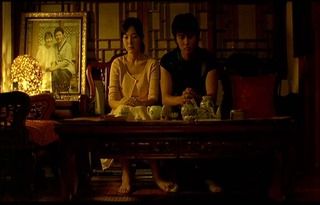
3-Iron
2004
Director: Ki-duk Kim
Starring: Hyun-kyoon Lee, Seung-yeon Lee, Hyuk-ho Kwon
Sometimes the best experiences you have with a film are when you know absolutely nothing at all about it. Such was my experience with 3-Iron, a little film I had barely heard of, and randomly decided to borrow from the library. It far surpassed my expectations.
Sun-hwa, a young man (Hyun-kyoon Lee), breaks into people’s homes while they are away on vacation. He stays there, sleeps in their beds, eats their food. In return, he does small menial tasks around the house: laundry, fixing appliances, etc. After breaking into a seemingly empty house one night, he realizes that the wife (Seung-yeon Lee) is still there, and clearly being abused by her husband (Hyuk-ho Kwon). Thus begins 3-Iron; the rest of a film is a play out of the relationship between these three people.

This is a very unique movie. I wouldn’t go quite so far as I’ve never seen another quite like it (not far from the truth), but this is far from typical film fare. The largest discrepancy between this and “traditional” movies is the fact that the two main characters, Sun-hwa and the wife, are nearly completely silent throughout the film. “So what,” you may say, “The Artist was a silent movie and it just won Best Picture, that’s not so unique.” Lemme finish. These two characters are not just silent; they are stoic as well. It’s not enough that they don’t speak; they emote extraordinarily little. And therein lies the triumph of 3-Iron; for two such seemingly “flat” performances, the film delivers an incredibly complex and nuanced relationship between them. While watching the film, I found myself “learning” what their merest actions meant. What that glance up meant, why she slowly looked to the side there. There is a profound relationship between these two characters, but it is extremely quietly built. This, according to IMDb, is a trademark of the director, Ki-duk Kim. It’s really a fascinating commentary on human communication and connectivity. These two characters feel as if they are soulmates, as if they were destined for one another, and Kim gives us very little of them. It doesn’t matter; we get it.
The central tension of the film comes from the triangle between Sun-hwa, the wife, and the husband. By the end of the film, there is resolution to this triangle (naturally), but what I enjoyed very much about the story is its multiple interpretations. About halfway through the film, partly due to the lack of dialogue between the two main characters, the thought popped into my head about the possibility of one of the characters being a ghost. Kim’s direction is so subtle that this interpretation of the plot works. I argue that 3-Iron can very easily be read, in the second half, as a ghost tale. In my opinion, there is a very clear point where one of the characters dies, and every time we see that character afterwards, it is simply a premonition. On the other hand, this interpretation is not necessary. The death is never shown on screen; it was something I interpolated from other information in the film, not something that was overt. One can also read the film at face value, following the straightforward narrative structure through to the finish. What I love about movies like this is that both interpretations work. One isn’t necessarily right or wrong, or better or worse than the other; both work, both are valid ways of reading the film. If the character is a ghost, it lends the film an air of the supernatural; if the character is not a ghost and never died, it provides fascinating social commentary. There are no losers here.

My final note: I watched this movie with my husband in the room. My husband doesn’t watch everything I watch; he’s not as crazy about film as I am. I asked him if I could watch this on our big screen in our living room, and he said yes, then asked me if he could play his video game on the other television in the room. (Yes, we have two televisions in our living room: one for video games and one for movies – this is not the first time we’ve had conflicting interests about what to put on the screen.) I popped in 3-Iron and started watching it. So did Rob. Ninety minutes later, the video game was not turned on. Rob had watched the entire thing without meaning to. When it finished, he said, “That was a little weird. But that was good.” Trust me, from my husband, the fact that the film sucked him in without his permission and kept him from playing Skyrim is high praise indeed.
Kim’s movie is slow and elegiac in tone. This is not a fast-paced shoot ‘em up; please do not expect that. This is quiet, this is thoughtful, and very carefully paced. If, however, you are in the mood for a moody story, one where the world is quiet, the sky is gray and cloudy, and there are long, lingering shots of homes and the faces in them, then this will thrill you.
Arbitrary Rating: 8/10. Not for everybody, but if this description sounds interesting, I don’t think you will be disappointed.
I loved this movie, and you've described it perfectly. I found it moving almost in spite of itself. The final shot of the scale is one of the most singularly beautiful moments I have ever seen in film, and never fails to elicit an honest gasp from me.
ReplyDeleteYou're right that it's not for everyone, but for those who can appreciate it, there's nothing else like it.
I found it moving almost in spite of itself.
ReplyDeleteEXACTLY.
To me, the fact that it reeled in my husband without him having any plans to actually watch it speaks volumes about just how good it is.
Re: the final shot - I had to refresh myself as to what the actual final shot was, BUT - YES. AWESOME. It made me smile.
I saw this recently. I also watched this intentionally knowing nothing about it. I liked it. I agree on being able to pick up the meaning on small little movements. I honestly would have been happy if the entire movie consisted of nothing more than them going from apartment to apartment, with the whole police subplot not being there. It's not that I disliked it; it's just that the apartment hopping I found to be far more interesting than I ever would have imagined. (And that's a great trick - placing flyers over the handles of doors to see which apartments are unoccupied.)
ReplyDeleteSeriously, the flyer thing is so clever, and it would work so well. I had a bit of a moment of "yeah, someone could TOTALLY do that" when watching this movie. Criminal Masterminds 101.
DeleteI think I liked it better when our main couple was together, too.
This is such an unusual film. I'm glad you liked it!!!